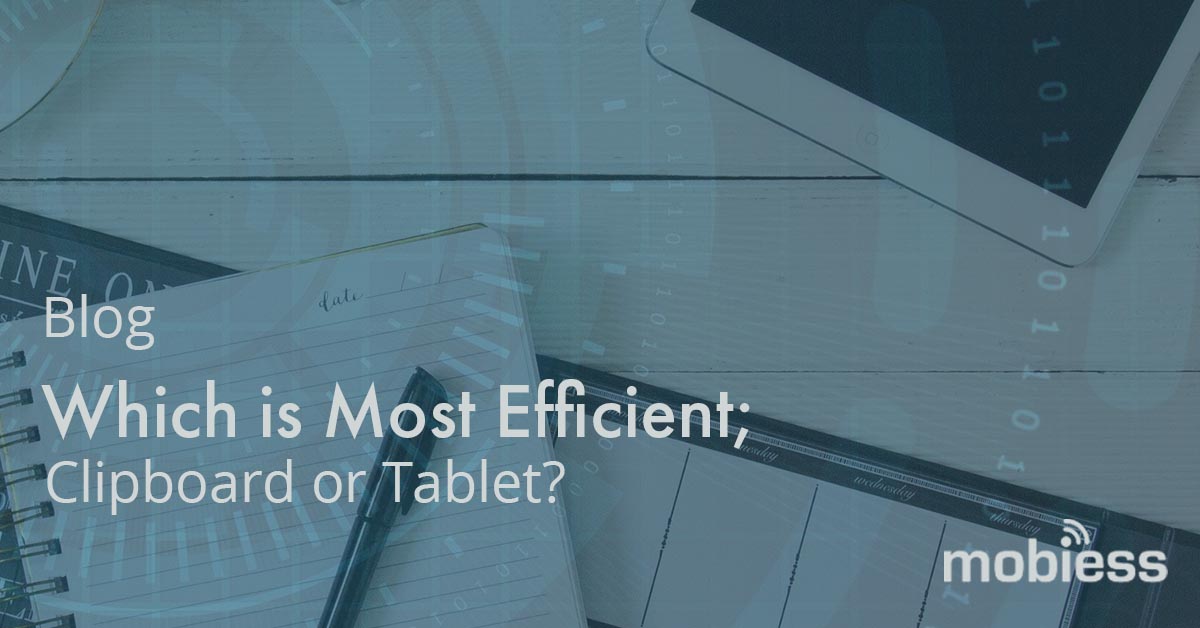Obviously, in modern business, we all have access to computers, and have used them in our work – or know that the work we do is recorded somewhere, by someone, on computers. The systems record our working hours, the tasks we complete, the customers and contact information we need to maintain, and anything recorded on paper is, eventually, referenced in or linked to digitised data.

Facilities management is no exception – and most of the scheduling and recording of information relevant to our work is inputted in digital systems – but there are still a great many places where information is being processed on paper, work is distributed on paper, inspections are completed with a clipboard and a pen, and the information is collated in a central office. This can be cumbersome, slow and, the more hands which touch data before it is stored, the more opportunities there are for mistakes to be made, errors to slip into the system, and some areas are overlooked, ink smudges, pens run out, paper gets damaged or lost, and information doesn’t get stored or shared as quickly or with as much detail as it ought to be.
Most organisations now use a combination of core business applications and spreadsheets to run their processes and organise business functions. Spreadsheets fulfil an important role in these – allowing even non-technical staff to bridge the gap between applications and process, to allow the organisation to function efficiently.
However; a great many facilities management teams still have field staff collecting critical business data with a combined approach of pen and paper, with clipboards of information sheets that need to be filled, filed and submitted to the office – and some excel sheets on tablets to digitise aspects of the data.
Whilst these steps towards digitisation have moved things forward, and simplified some processes, it actually makes things more complex. There are gaps in the data and knowledge being shared, and it actually isolates data more than sharing it across the board, as the information is being stored locally, and not always explored by the wider team.
Obviously – as designers of mobile solutions – we are pro-tech, and will sing the praises of e-forms and digital systems; we often hear “I can collect the information more quickly on paper” – and if collecting information was all that you wanted to do, that would be fine…but what use is isolated data? We don’t collect information simply to pop it away in a box – it’s stored and processed to share and retain information, to streamline work processes, to update maintenance work and compliance inspections, and to schedule and delegate tasks to the appropriate teams.
Collecting this information on paper means that it sits in the cab of a van, or in a car’s back seat, until the team member visits the office, where it is handed to someone at a desk. This person will then input the data into an excel spreadsheet so that there is a digital, sharable copy of the information. This then needs to be imported to a database, with countless validations necessary – and much of the data can end up being rejected.
Compare this labourious process to an organisation using an e-form solution; all of those validations and rules can be plugged into the digital platform, and every tablet and mobile device being used to access and populate the forms are primed in advance, to prevent information being rejected; the person inputting the data is promoted to provide the correct information there and then.
This ensures that all the data being collected is high quality and relevant – and then present the data in a clear and informative way, comparable to previous periods, other sites, upcoming schedules and timetables for ongoing works.
This usable data isn’t simply filed away, and collecting it is far more than a box-ticking exercise; data is a first class citizen, and can revolutionise your processes if it’s handled well.
Smart data is useful to the whole team, immediately updating newly inputted data so that anyone who has access to the system can see real-time updates, respond in the moment, and streamline the processes and information sharing which are so vital in facilities management.
Picture meeting with your client to discuss the agreed KPIs; their scoring, comments, requests and actions are inputted to the tablet through the meeting, and the data is collated immediately to present a branded report of that meeting directly to the client, before you’ve even left the room. All non-conformities are raised as help desk tasks in your CAFM system, and everyone is up to date on where the project stands, what needs to be done, and who is taking ownership of each task. This is smart data, and smart companies, at work.
Call our team today to see how we can help automate your processes, and drive smart data into your business using our highly configurable e-forms and auditing platforms ; call today on 0203 411 1795 or visit https://www.mobiess.com/ to request a demo of our systems, and let us start your path to collecting smart data.


